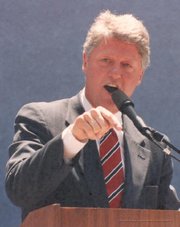One important marker of a Transformative Election is how obvious, and how early, a path to victory can be seen.
That’s because, as I noted before, elections that transform our political myths, that begin new eras, are never really close.
In the case of Barack Obama, victory can be his simply by reflecting on this history, and the nature of the coming choice. He doesn’t have to attack his opponents. He doesn’t have to divide his party.
He doesn’t even have to be explicit. He doesn’t have to endorse Internet Politics. He is already echoing its themes.
For better or for worse, Hillary Clinton has established herself as
a transactional leader. Such leadership works well when political
assumptions are set, when the balance of power is not subject to
question.
Bill Clinton, who was the same age Obama is now when he announced for the Presidency in 1991, created an Anti-Thesis to the Reagan-era political
thesis, a "third way" that sought to lean against the Reagan-era
assumptions and balance its more extreme aspects against the grassroots
of his own party. As Senator his wife has continued in this leadership
style, "listening" so as to not go too far from the center, leaning
carefully into the Bush headwind, calibrating each vote carefully in a
parsed, nuanced manner.
This is not an indictment, and it is not a criticism. It is the
reality. These are useful skills, when implementing policies which have
already been passed, or in navigating toward the center of established political
opinion.
That’s not where we are. The political myths of the last 40 years
have failed. Those values no longer apply. They have us focused on
Iraq, on securing access to oil, on questions of religion, that are
irrelevant to our real crisis.
We need new myths and new values to address this new crisis, a whole new set of political assumptions within which we will build a new political spectrum. Values like consensus, transparency, and connectivity are at the heart of that new thinking, because these are the values implicit in the Internet, the new dominant medium of our time.
Obama has talked a lot lately of "consensus," and some in the
Netroots see that as a code for knuckling-under to the Right, because
that’s how the dominant Thesis has always used it.
But it doesn’t have to mean that. It can mean, simply, starting with where we agree and working outward.
The same is true for transparency, a favorite theme of the Netroots,
both left and right. Obama has been transparent on the errors of his
past. The skeletons are out there. He has chosen to own them. This
makes it easier for him to call for transparency from government, and
from rival campaigns.
Connectivity is what you find on his Web site. I have argued that
it’s mainly back-and-forth connectivity, not up-and-down connectivity,
but that’s a flaw that can be fixed.
A thematic campaign works best when a new Thesis is being born and after it’s accepted. A programmatic campaign works best when you’re in
opposition. By running a thematic campaign, Obama makes an important
contrast clear.
Time will tell, but right now Obama is s closer to being the Internet candidate than his rivals. That’s what is giving his candidacy lift.










